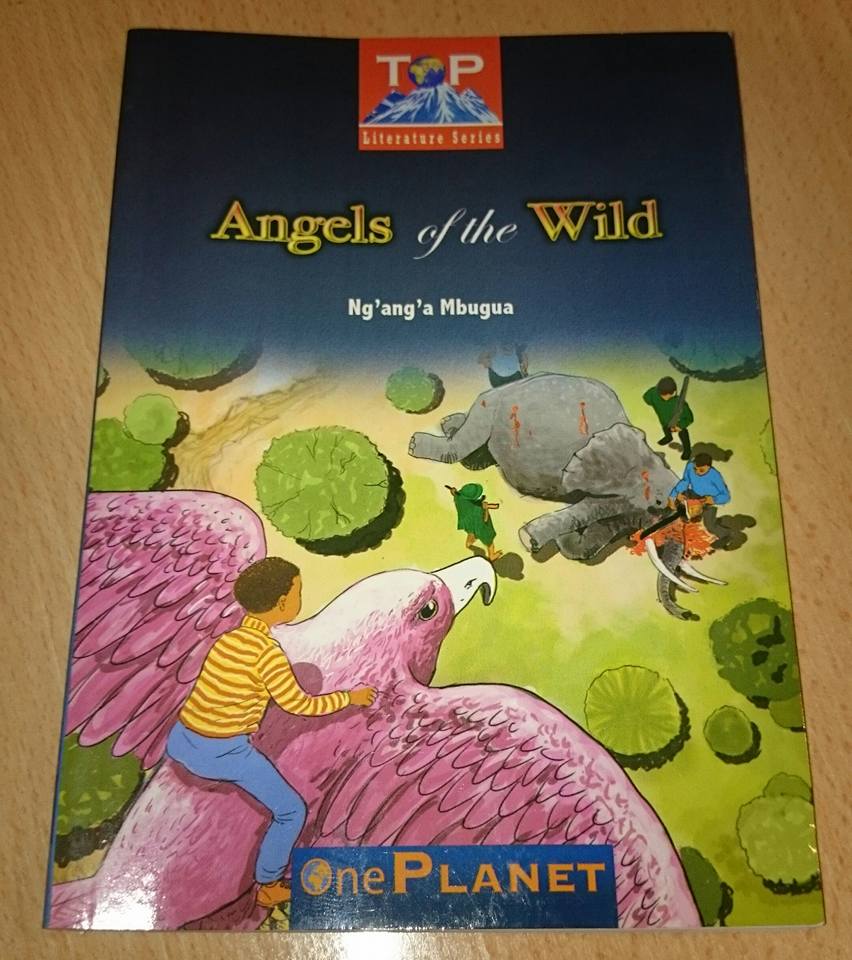




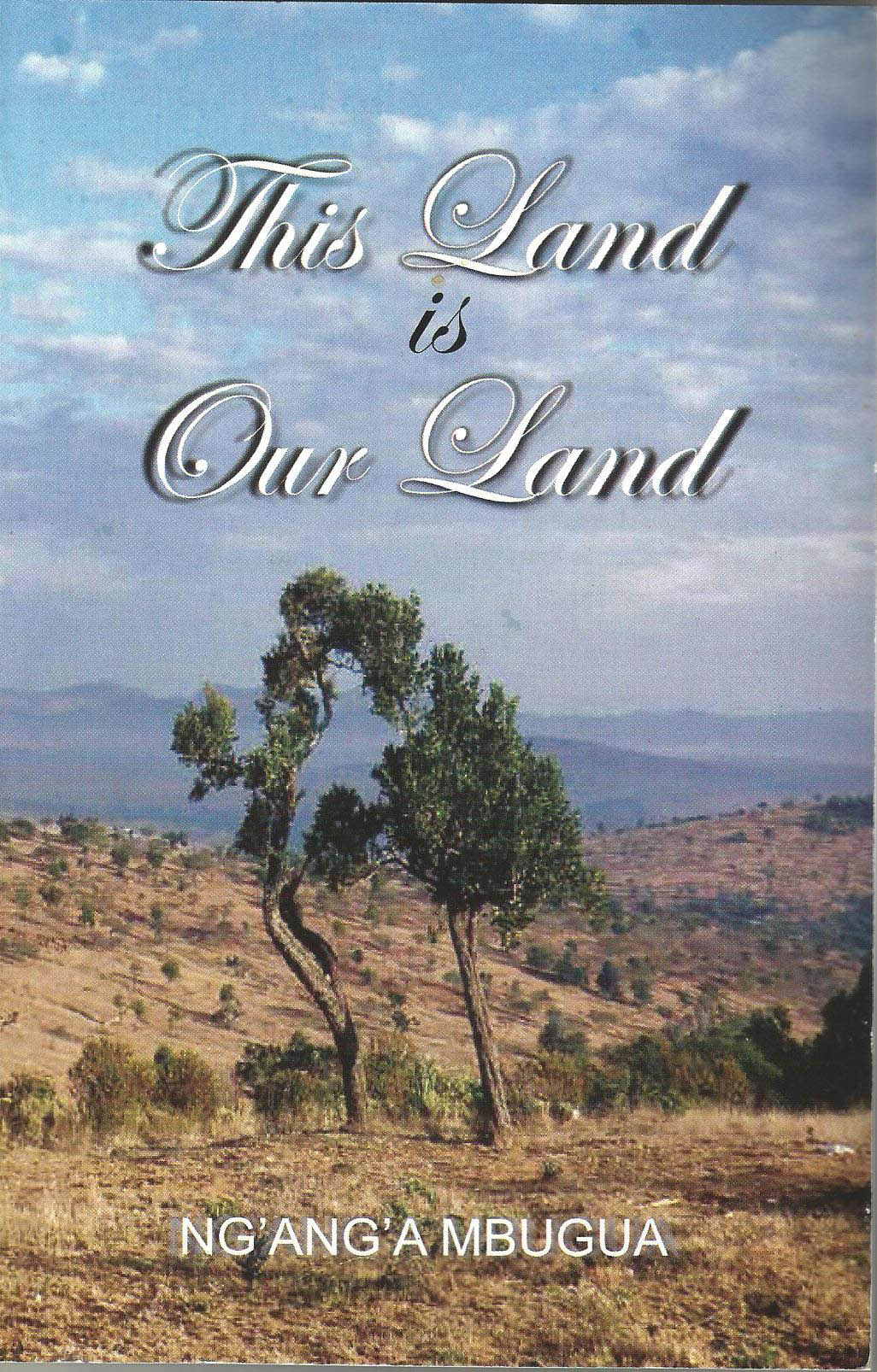
This year’s Wahome Mutahi Literary prize is shaping up to be another epic battle between surgeon Yusuf Dawood and journalist Ng’ang’a Mbugua. They both have been nominated in the Adult English category of the award set to be delivered at the end of September.
Dawood’s book The Last Word, published by Longhorn a collection of essays that have been published in the Surgeon’s Diary column in Sunday Nation, has been nominated alongside Mbugua’s book This land is our Land, (Big Books) a collection of poetry. The other nominee is a book titled A Gift from a Stranger (KLB) authored by Waigwa Wachira.
The first contest between the two took place in 2011 when Dawood’s novel Eye of the Storm was nominated alongside Mbugua’s Terrorists of the Aberdare. Eye of the Storm took the ultimate prize with Terrorists of the Aberdare coming in at second. Literary observers agree that it was a close contest.
In 2012 the two writers were at it again. Dawood’s book Eye of the Storm was again in contention, this time for the Wahome Mutahi Prize against Mbugua’s Different Colours. This time Mbugua took home the prize. Mbugua is a veteran of the Wahome Mutahi Prize as Terrorists of the Aberdare had won the prize in 2010.
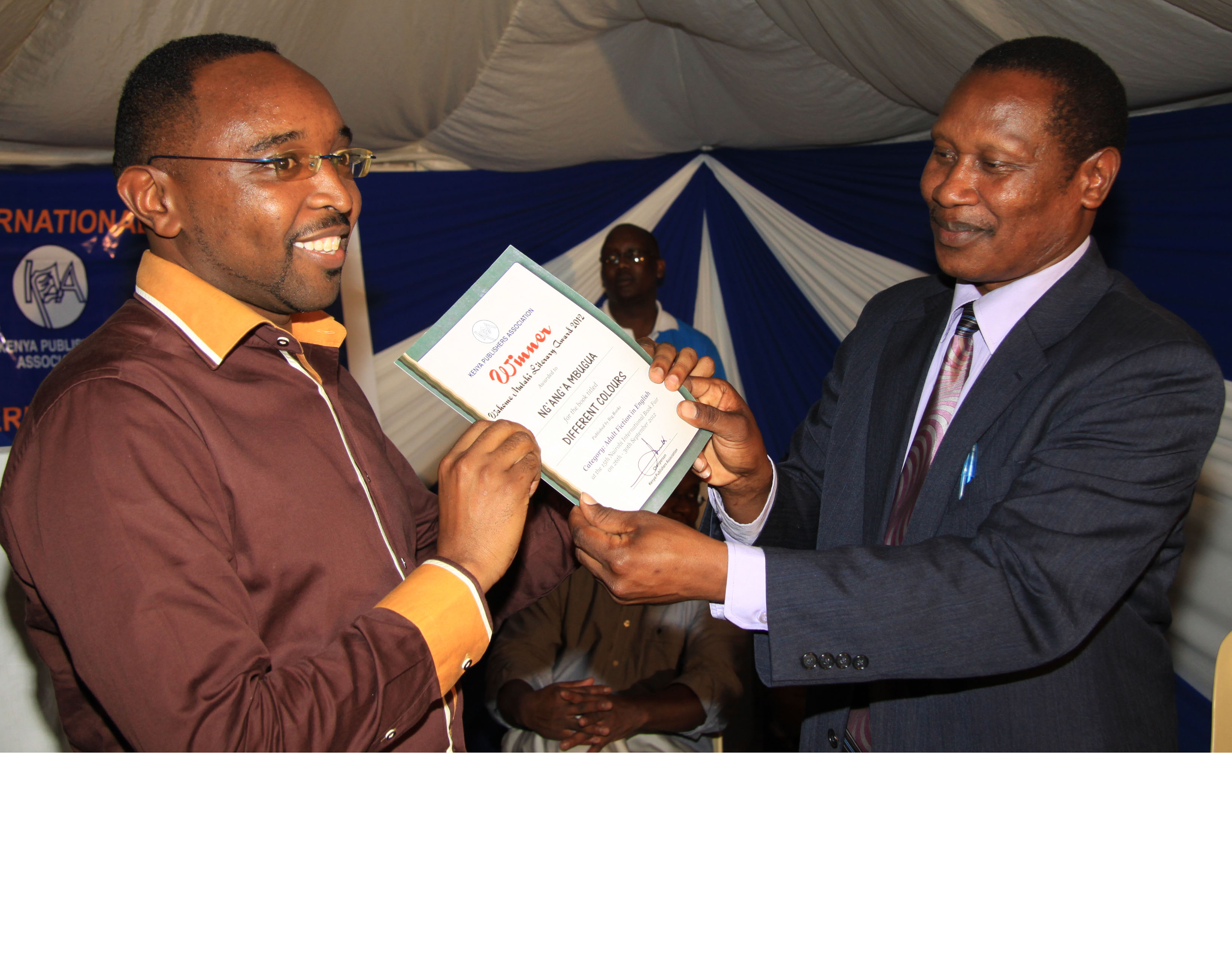
The Wahome Mutahi Literary Prize is held every two years in honour of the late humourist and novelist Wahome Mutahi of the Whispers column fame. It is organised by the Kenya Publishers Association and held at the end of the annual Nairobi International Book Fair.
There are four different categories to be awarded in the Wahome Mutahi Prize, namely English Adult, Kiswahili Adult, English Children and Kiswahili Children categories. The two children’s categories were introduced for this year’s Award.
Nominees in the Kiswahili Adult category are Juma Namlola’s Kula kwa Mheshimiwa (JKF), Tom Olali’s Watu wa Gehenna (JKF) and Jeff Mandila’s Upepo wa Mvua (JKF). In the Children English category, the nominees are Charles Gecaga’s Kuti makes a Difference (KLB), Naomi the Detective by Joseph Muleka (KLB) and A Note for Alice by Mureithi Maina (Moran).
In the Kiswahili Children category the nominees are John Kobia’s Maskini Punda (KLB), Kiswahili Gani by Lilian Wairimu (KLB) and Bitugi Matundura’s Adhabu ya Joka (Longhorn). Winners in each category will take home a cash prize of sh50,000.
A win for Ng’ang’a will be a major boost for Kenyan poets at it will be the first time a collection of poetry will be winning a major literary prize in the country. Literary prizes in Kenya are seen to only recognise prose writers. The Wahome Mutahi Literary Prize however has demonstrated its flexibility when the prize was awarded to activist Okoiti Omtata’s play Voice of the People in 2008.
Check out our review of Mbugua’s poetry book.
The judging panel consists of Dr Tom Odhiambo, as chair, of University of Nairobi, Prof Wangari Mwai of Kenyatta University and Rose Mavisi of Catholic University.

A poet, like a spider, works tirelessly spinning silver yarns. He struggles, endures until finally, a pattern is made: a web of beauty; a trap for the reader.
Those are not my words; I have just paraphrased Ng’ang’a Mbugua’s poem A Poet for it beautifully captures what good poetry does to a reader. It rejuvenates the soul, runs away with your imagination and makes you want to create some poetry of your own. At least that is what it does to me.
The above quoted poem is contained in an anthology titled This Land is our Land by Mbugua. In his seminal book Things Fall Apart, the late Chinua Achebe quotes an Igbo proverb that goes something like: “When the moon is shining the cripple becomes hungry for a walk”. For purposes of describing this book, I would have replaced walk with dance, for dancing is more poetic. After reading this collection even the most hopeless of writers would wish to create some poetry.
The vivid imagery in Mbugua’s poems seduces the reader’s imagination and drags you along to that secret world where only talented poets can take you. Take for example that short poem titled The Voice. The poet relives the relief of old Abraham and his son Isaac, when they laid their eyes on that ram, horns entangled in that thicket; specifically delivered to save the young man from the harsh knife wielded by his father.
From the introduction the reader mentally prepares themselves for a sermon on the all-enveloping love of the God of Abraham, Isaac and Jacob, until the poet takes an unexpected if not cheeky detour:
Abraham lifted high his knife
And was about to strike
When out rang a voice
“What do you think you are doing?”
It was the voice
Of the owner of the lamb.
Aside from improbable Bible stories This Land or Land also captures the modern day realities and renders them in a way both entertains the reader and still retains the sting that admonishes our follies without being too preachy. A case in hand is the poem titled You should know people. Here, the poet brilliantly highlights the ever-widening rift between the haves and the have-nots.
‘You should know people’ therefore becomes the metaphor of what the poor should do in order to be ushered into the rarefied world of privilege. Sample this:
In a land where the many and the hungry are one and the same…
It pays to know people
If you are to be spared the pangs of want.
From the title This Land is our Land, one might think that this book is a patriotic ode to the Nation that celebrated 50 years of self-rule. The truth about the poem, however, is that it is a cynical appraisal of the nation our country has morphed into.
The poem is actually a deep-seated cry for peace, while also alive to the fact in the country we find ourselves in ‘real peace’ can never be attained. Or rather, some quarters would not allow for such peace to prevail; and that is why the poet is crying out for ‘just any peace’.
While the meaning in This Land is our Land might be somehow obscured Let’s Create Misery is an open bare-knuckled rebuke of wielders of power and who derive moronic pleasure from the suffering of the masses. Here, the ‘creators of misery’ revel in their ability to make people die; for they will create jobs in morgues, and more jobs ‘for coffin carriers and grave diggers’
And if all the workers die
We’ll have bigger farms
To grow coffee, tea, cotton
No more food crops…
Oh, and there are also some love poems in the anthology as well including a tragic love story of Andrew and Jane who were ostracised by the church brethren, whose tongues began to wag, Casting the little couple in shady light/Preaching that they were far from right.
And who told you African names can’t rhyme? What about The merry old man from Ndumberi, who loved strawberry, and whose love was Njeri. Thus goes the tale of Wanderi.
Mbugua should be commended for investing his hard-earned funds to bring this publication to reality, at a time when mainstream publishers are giving poetry a wide berth and Kenyans think poetry is hard.
This book is selling at sh 350. You can order it through sales@bigbooks.co.ke or through the author at mbugua@bigbooks.co.ke
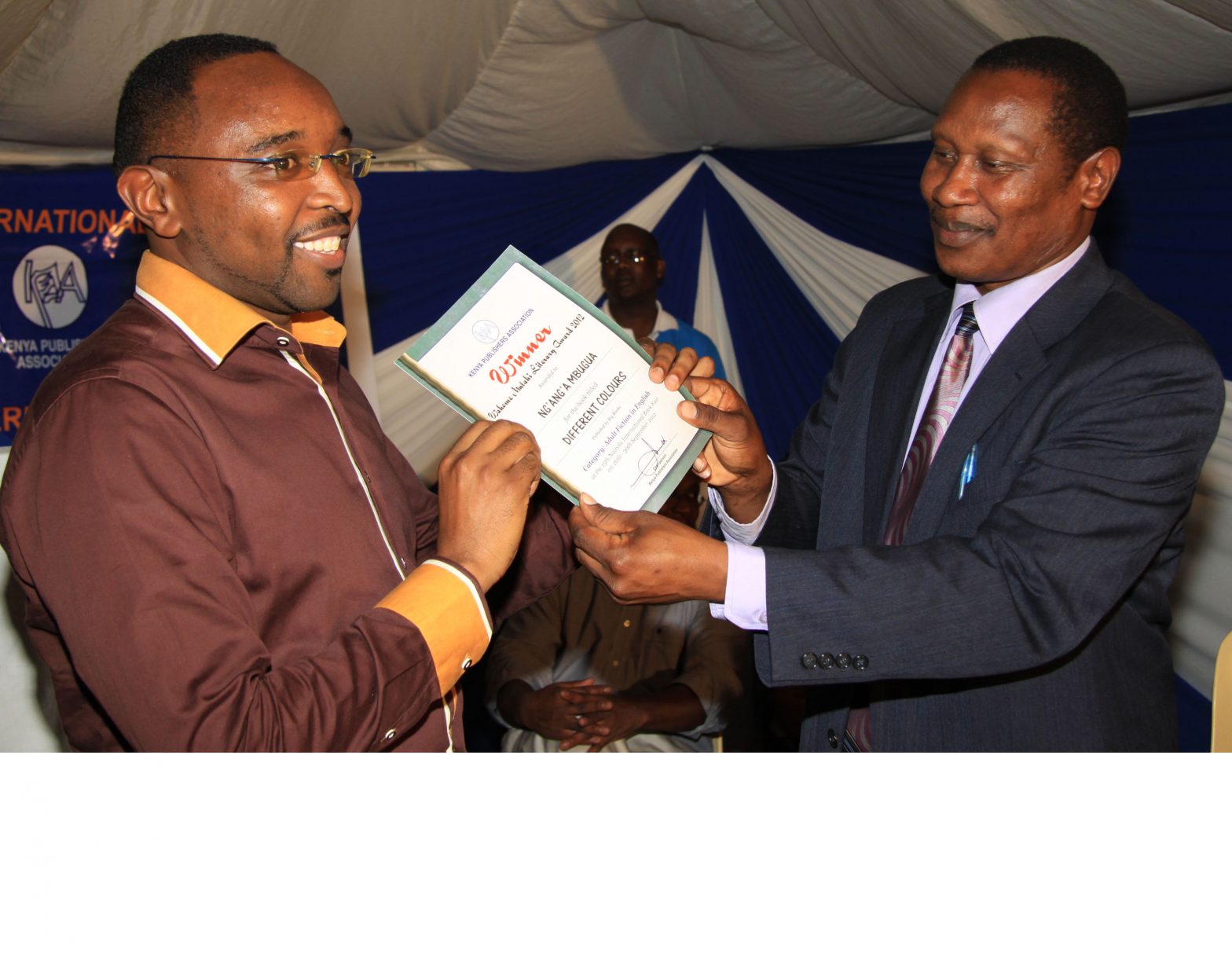
Nation journalist Ng’ang’a Mbugua, is this year’s Wahome Mutahi’s Literary Prize winner with his book Different Colours. This makes it two times in a row that he has won the prize.

In 2010, he won the same prize with his other book Terrorists of the Aberdare. Different Colours is published by Big Books. Ng’ang’a’s book beat a formidable competition from Dr Yusuf Dawood’s book Eye of the Storm (East African Educational Publishers) and David Mulwa’s book, We Come in Peace (Oxford University Press). Eye of the Storm won last year’s edition the Jomo Kenyatta Prize for Literature.
In the Kiswahili category Jeff Mandila’s book, Sikitiko la Sambaya (JKF) was the winner, beating other nominees John Habwe’s Pamba also published by JKF and Mwenda Mbatia’s Msururu wa Usaliti (EAEP). The two winners took home cash prizes of Sh50,000. John Habwe won the Kiswahili prize in 2010 with his book Cheche za Moto.
The Wahome Mutahi Literary Prize is held every two years in honour of the late humourist and novelist Wahome Mutahi of the Whispers column fame. It is organised by the Kenya Publishers Association and held at the end of the annual Nairobi International Book Fair, which was in its 15th edition.
The judging panel was led by Prof Henry Indangasi of University of Nairobi, Prof Wangari Mwai of Kenyatta University and Dr Tom Odhiambo of University of Nairobi.
Ng’ang’a Mbugua, who is the chief sub editor of Business Daily said that he was happy to have won the prize two times in a row saying that it was testament of the hard work he put into his writing.
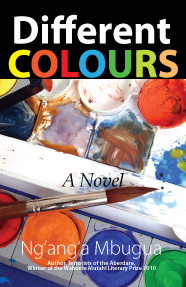
It would appear that matters to do with environmental conservation occupy a special place in Ng’ang’a Mbugua’s world. Yet, it is these conservation matters that fire his creativity. His last two books have all focused on environmental conservation as their central theme.
And while these issues might appear boring and the least likely subject of a novel, Mbugua has nevertheless breathed life into these otherwise mundane issues and crafted interesting stories around them.
Call him an NGO novelist, an environmental crusader/activist, and any other such names but the fact of the matter is that Mbugua’s books are immensely readable. This is a refreshing departure in an environment where captivating Kenyan writers are few and far between.
Mbugua’s foray into ‘environmental writing’ started with his book Susana the Brave, a primary school reader that talked about a teacher, who after being posted to a school in an arid area, went ahead and transformed the place due to her dedicated campaign to plant trees.
His second book, Terrorists of the Aberdare, addressed the delicate issue of human wildlife conflict and by extent, forest conservation.
And for his troubles Terrorists won the third edition of the Wahome Mutahi Literary Prize. The book was also short listed for the 2011 edition of Jomo Kenyatta Prize for Literature.

His latest book, Different Colours, and which I think is his most ambitious so far, has taken the game a notch higher. Not only has he written on his pet subject, he has fused it with the sublime world of Art.
Different Colours revolves around an imaginary waterfall in an equally imaginary Banana County, which is threatened by an unscrupulous merchant who starts to mine building stones from around the waterfall. The hero of the book is Miguel, a dreadlocked artist – don’t they all sport dreadlocks? – who, after hearing of the beauty of the waterfall decides that he must immortalise it on canvas.
It is while on one of his surveying missions that he accidentally bumps into a group of men hard at work in a secret quarry. The story unfolds after the owner of the secret quarry is alerted of Miguel’s nosiness.
Not that Dik Teita (note the play on the word dictator) hadn’t had his fears as to the ‘real’ intentions of the newly arrived ‘rastaman’. The moment he got wind of Miguel’s mission of painting the waterfall – word travels fast in Banana – he feared it was a matter of time before his secret quarry was discovered.
To prevent this, Dik Teita comes up with what he thinks is a convenient smokescreen; make Miguel paint the local cattle dip – who, in their right minds assigns such jobs?
Seeing as the cattle dip ruse didn’t work, Dik Teita resorts to intimidation and threats of violence. And who better does this dirty work than Vu Tabangi (bhang smoker) the village thug. Sadly for Dik Teita, the threats have the opposite effect on Miguel: his resolve to save the waterfall from destruction hardens. Together with Angela, a widow who also happens to be his landlady, they mobilise the local community on the importance of conserving the waterfall, which is their lifeline. They also enlist the services of Derek, Miguel’s friend, who is also a tech geek. Derek also has contacts in media.
Meanwhile, the noose tightens on Dik Teita and his goons. It also emerges that Dik Teita was behind the death of Angela’s husband.
While the waterfall conservation saga is engrossing I found the parts dealing with Miguel’s art most appealing. It is either that the author is an accomplished art connoisseur or that he had done thorough research on all that entails art, paintings and other forms of visual art.
Whatever the case, the informed discourse on art really uplifts
Mbugua’s book.
In Different Colours, art meets nature, and it is in the appreciation of the beauty of nature that Miguel’s talent and eye for detail enriches the conservation narrative.
Due to their unconventional behaviour society tends to misunderstand artists. Most of the times artists are seen as misfits. And Miguel was no exception; in one classic moment, Miguel is told that people come to the waterfall to commit suicide. “It is a good place to die,” he says more to himself, probably after being overawed by the beauty of the falls.
Throughout the book, the author teases romantics with the probable love affair blossoming between Miguel and his widowed landlady. Even at the end of the novel, he only hints at what might come between the two.
This book, in my view, is a fitting tribute to the late Nobel Laureate, Prof Wangari Maathai. Your work, Mama Miti, was not in vain.
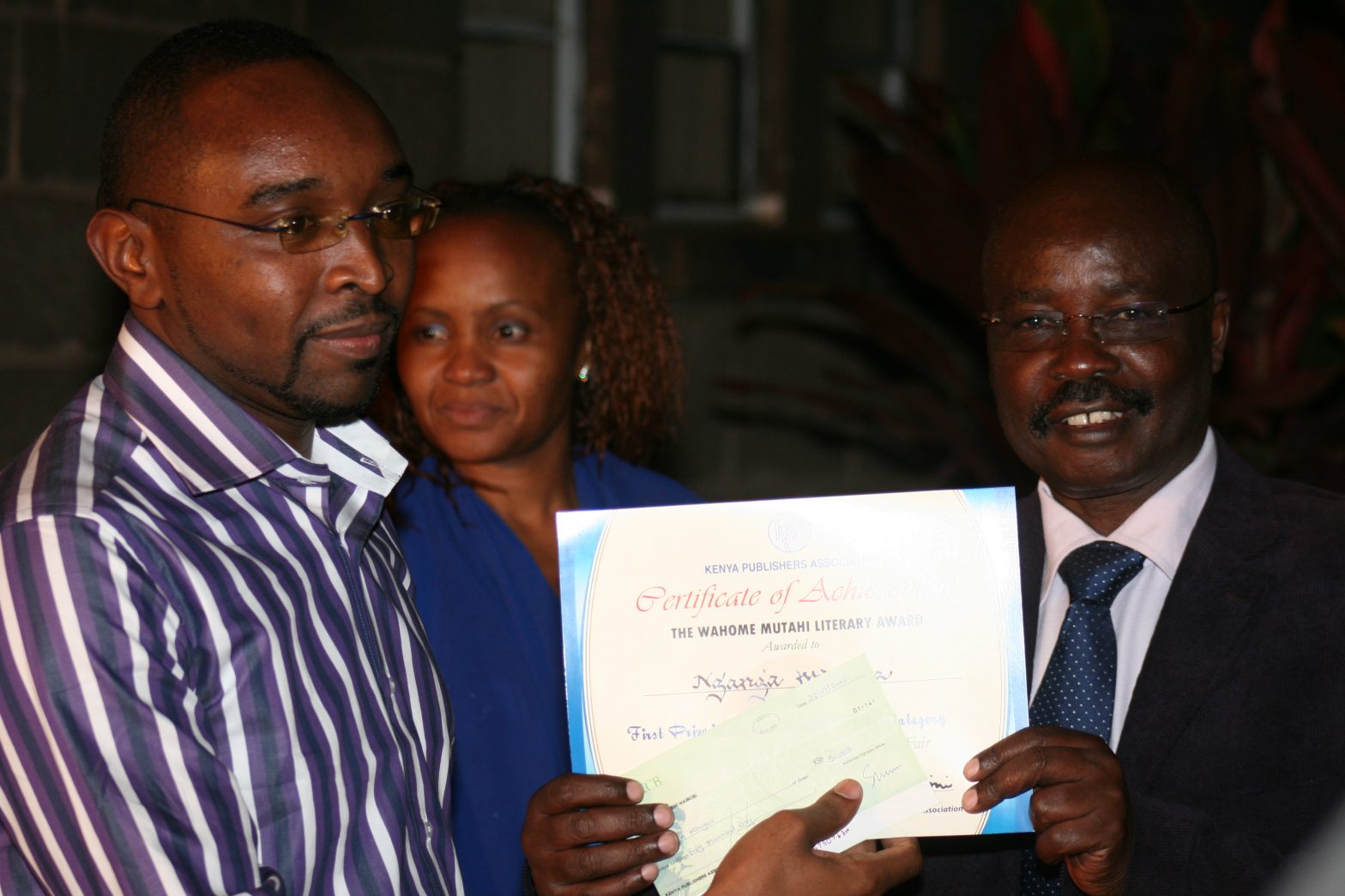
Ng’ang’a Mbugua’s novella, Terrorist of the Aberdare has won the third edition of the Wahome Mutahi Literary Award, while John Habwe’s book Cheche za Moto won the Kiswahili category of the same prize. The awarding ceremony was the highlight of the 13th edition of the Nairobi International Book Fair.
An elated Ng’ang’a Mbugua, who is also the chief sub-editor of Daily Nation, says that the win has vindicated his edition to self-publish the book. “I presented the manuscript of this book to several publishers and they turned it down,” an elated Ng’ang’a told Maisha Yetu. “Since I had faith in the book I formed Big Books, took a small loan and published the book.”
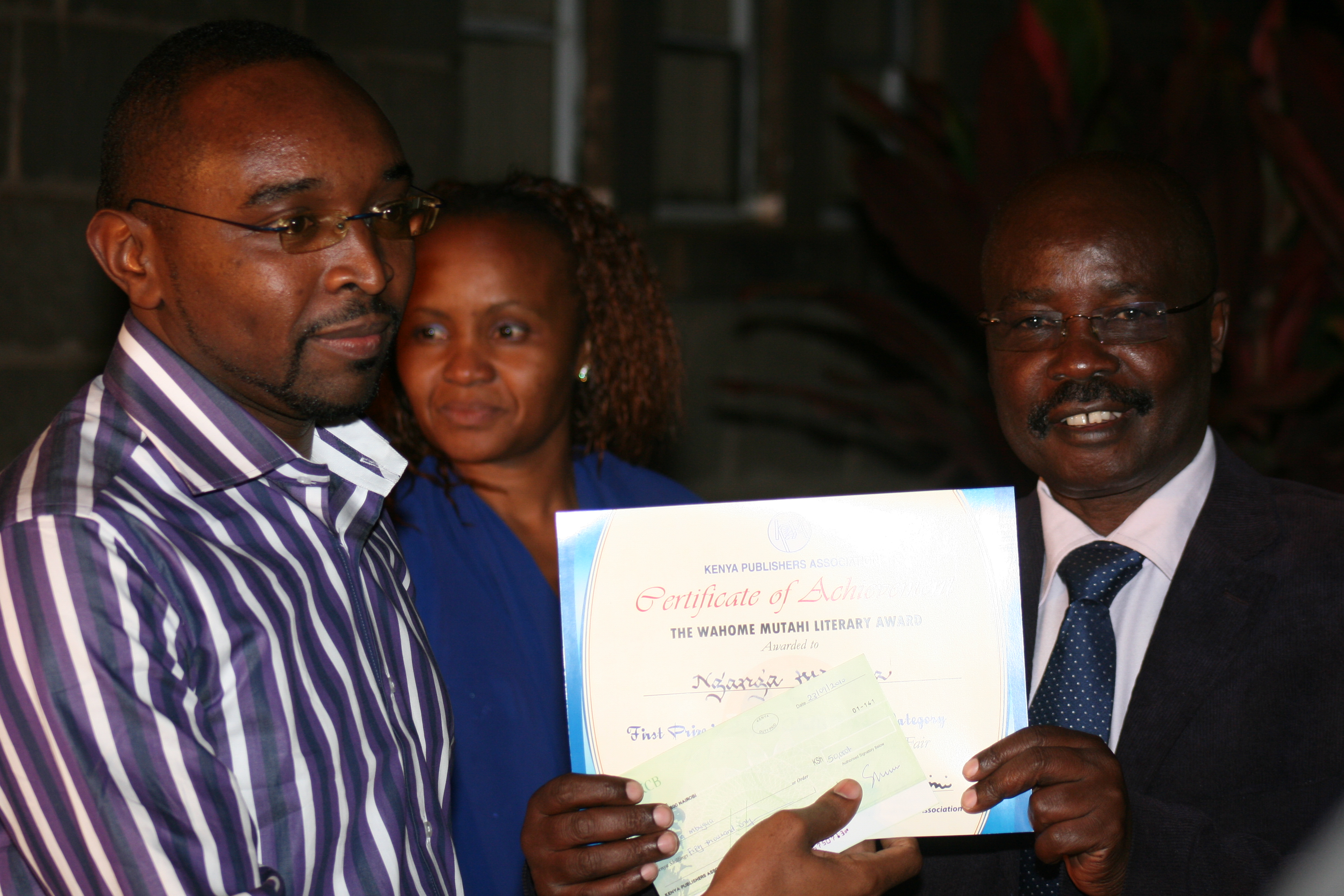
Ng’ang’a’s example shows that there is indeed life after publishers slam the door on a writer. I can imagine how the publishers who rejected the manuscript felt after Ng’ang’a stood to receive his prize. “Were we that blind?” they must have been asking themselves. And what does this say about the judgment of publishers who were given the chance to publish this book, and they rejected it? Should we start questioning their competence?
How many more potential winners are publishers sitting on? not to mention the ones they have rejected?
You might be wondering what Terrorist of the Aberdare is all about, whether it has anything to do with America’s old enemy, Osama bin Laden. Having read the book I can assure you that it has nothing to with Osama’s brand of terrorism. It talks about a different kind of terrorist: it is about elephants that cause havoc to farmers’ crops
These elephants leave the park and come to destroy farmers’ crops. Apart from that they also kill farmers who stand in their way. In Ng’ang’a’s book the victim of the elephant’s terrorism happens to be one Sonko Wakadosi, who was dispatched to his Maker by a rogue elephant. The author manages to address the serious issues of human wildlife conflict and environmental management by employing humour.
For the last few days Kenyans have been riveted by the exploits of one Mike Mbuvi ‘Sonko’, who trounced ODM’s Reuben Ndolo and PNU’s Dick Wathika to clinch the Makadara parliamentary seat in Nairobi. While talk about Sonko (rich man in Sheng) has revolved around his seemingly endless riches, the Sonko in Ng’ang’a’s book is dirt poor, and whose hope of striking it rich was through the sale of the cabbages so beloved of the elephants.
For his trouble Ng’ang’a takes home Ksh50,000 (625USD). But for Ng’ang’a money is the issue. it is about the recognition that comes with the win. “I plan to ride on the publicity generated by the win to really market my book,” says Ng’ang’a, whose company has already published a short story The Last Kiss, which is doing relatively well in the market.
Even before the award Ng’ang’a says that Terrorist of the Aberdare has done well in the short time it has been in the market, and that he has managed to recoup the money he invested in publishing the book.
The first edition of the Wahome Mutahi Prize was won by Onduko bw’ Atebe’s Verdict of Death, in 2006, while activist Okoiti Omtata’s play Voice of the People, won the prize in 2008.
Ng’ang’a has written other books including Mwai Kibaki: Economist for Kenya, (Sasa Sema) Catherine Ndereba: Marathon Queen (Sasa Sema), Susana the Brave (Focus), among others.
Following the release of my book Henry Wanyoike: Victory Despite Blindness I am glad to announce that it has received its first review, mostly positive, in the Sunday Nation of October 25, 2009. The review was done by Ng’ang’a Mbugua, a journalist with Daily Nation. He is also a published author with several titles to his name. They include Mwai Kibaki: Economist for Kenya, Catherine Ndereva: Marathon Queen, among other. His latest offering is Terrorists of the Aberdare, a novella, which he has self-published. I hereby include an excerpt of the review.
Ngunjiri’s book, however, is distinguished by the fact that he is among the authors in the series who wrote his book with the full co-operation of their subjects, which cannot be said of some of the earlier biographies. And for that, the book is rich with insights that would otherwise have never made it to the public domain.
You can read the rest of the review here.
Remember, you can order it here